
Paul Henreid was an Austrian-American actor, director, producer, and writer. He is best remembered for two film roles: Victor Laszlo in Casablanca and Jerry Durrance in Now, Voyager, both released between 1942 and 1943.
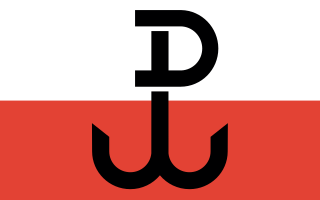
The Polish Underground State was a single political and military entity formed by the union of resistance organizations in occupied Poland that were loyal to the Government of the Republic of Poland in exile in London. The first elements of the Underground State were established in the final days of the German and Soviet invasion of Poland, in late September 1939. The Underground State was perceived by supporters as a legal continuation of the pre-war Republic of Poland that waged an armed struggle against the country's occupying powers: Nazi Germany and the Soviet Union. The Underground State encompassed not only military resistance, one of the largest in the world, but also civilian structures, such as justice, education, culture and social services.

The Polish Legions was a name of the Polish military force established in August 1914 in Galicia soon after World War I erupted between the opposing alliances of the Triple Entente on one side and the Central Powers on the other side, comprising the German Empire and Austria-Hungary. The Legions became "a founding myth for the creation of modern Poland" in spite of their considerably short existence; they were replaced by the Polish Auxiliary Corps formation on 20 September 1916, merged with Polish II Corps in Russia on 19 February 1918 for the Battle of Rarańcza against Austria-Hungary, and disbanded following the military defeat at the Battle of Kaniów in May 1918, against Imperial Germany. General Haller escaped to France to form the Polish army in the West against the anti-Polish German-Bolshevik treaty.
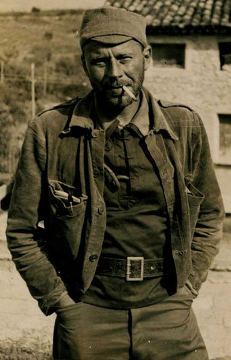
Alvah Cecil Bessie was an American novelist, journalist and screenwriter who was blacklisted by the movie studios for being one of the Hollywood Ten who refused to testify before the House Un-American Activities Committee. He was a member of the Communist Party USA and participated in paramilitary activity as part of the Comintern's International Brigades during the Spanish Civil War.
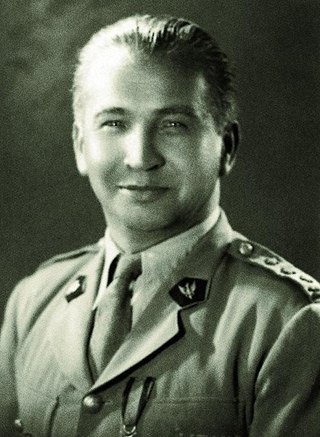
General Leopold Okulicki was a general of the Polish Army and the last commander of the anti-Nazi underground Home Army during World War II and German occupation in Poland (1939–1945). He was arrested after the war by the Soviet NKVD and died while imprisoned at Butyrka prison in Moscow.

The Nazis Strike is the second film of Frank Capra's Why We Fight propaganda film series. It introduces Germany as a nation whose aggressive ambitions began in 1863 with Otto von Bismarck and the Nazis as its latest incarnation.
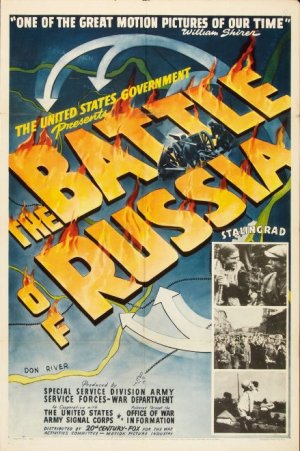
The Battle of Russia (1943) is the fifth film of Frank Capra's Why We Fight documentary series. The longest film of the series, it has two parts. It was made in collaboration with Russian-born Anatole Litvak as primary director under Capra's supervision. Litvak gave the film its "shape and orientation," and the film had seven writers with voice narration by Walter Huston. The score was done by the Russian-born Hollywood composer Dimitri Tiomkin and drew heavily on Tchaikovsky along with traditional Russian folk songs and ballads.

The Krzysztof PendereckiAcademy of Music in Kraków is a conservatory located in central Kraków, Poland. It is the alma mater of the renowned Polish contemporary composer Krzysztof Penderecki, who was also its rector for 15 years. The academy is the only one in Poland to have two winners of the International Chopin Competition in Warsaw as well as a few further prize-winners among its alumni.
Piotr Stefan Wandycz was a Polish-American historian. He was also the President of the Polish Institute of Arts and Sciences of America, and professor emeritus at Yale University, specializing in Eastern and Central European history.

The Battle of Britain was the fourth of Frank Capra's Why We Fight series of seven propaganda films, which made the case for fighting and winning the Second World War. It was released in 1943 and concentrated on the German bombardment of the United Kingdom in anticipation of Operation Sea Lion, the planned German invasion.

Hitler – Dead or Alive is a 1942 American propaganda war film directed by Nick Grinde. The plot of Hitler – Dead or Alive was inspired by true events but takes a quasi-comic tone.
Mieczysław B. Biskupski is a Polish-American historian and political scientist, with focus on Central European history and international relations.
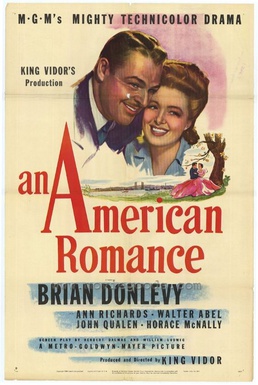
An American Romance is a 1944 American epic drama film directed and produced by King Vidor, who also wrote the screen story. Shot in Technicolor, the film stars Brian Donlevy and Ann Richards and is narrated by Horace McNally. The film is also known as The American Miracle.
Złota Maska is a Polish melodrama film directed by Jan Fethke based on two novels by Tadeusz Dołęga-Mostowicz. Although shot and scheduled for release in 1939, the post-production was interrupted by the outbreak of World War II, the subsequent need to pass German censorship meant it received only limited release in occupied Poland in 1940. The copy which survived has altered credits and subplot removed — scenes with Igo Sym were cut after the war.

A cult of personality developed around the figure of Józef Piłsudski, a Polish military commander and politician, in the interwar period and has continued ever since despite his death in 1935. At first, it was propagated by the Polish state's propaganda, describing Piłsudski as a masterful strategist and political visionary. It survived decades of repression during the communist rule of Poland. In modern Poland, Piłsudski is recognized as an important and a largely-positive figure in Polish history.
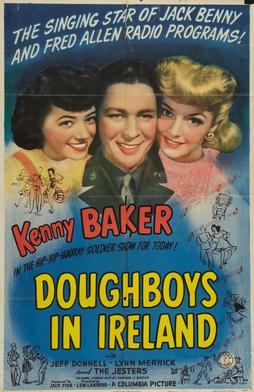
Doughboys in Ireland is a 1943 American musical war film directed by Lew Landers and starring Kenny Baker, Jeff Donnell and Lynn Merrick. The film offered an early role for future star Robert Mitchum, who appeared in many films that year.
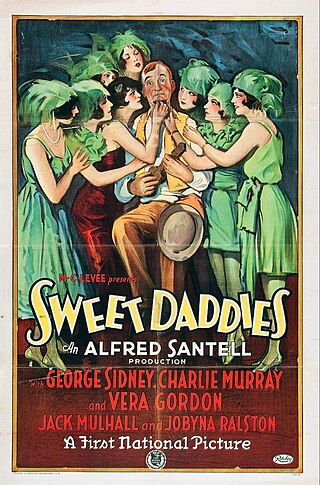
Sweet Daddies is a 1926 American silent comedy crime film directed by Alfred Santell and starring George Sidney, Charles Murray, and Vera Gordon. The film foregrounds positive relationships between Jewish and Irish American characters, despite the presence of some stereotypes.

The Służew Old Cemetery is a Roman Catholic cemetery in the area of Stary Służew in the Ursynów district of Warsaw, Poland.
Adolph Milar (1895–1950) was a Swiss-born film actor. He appeared in character roles in around sixty American films from 1919 to 1945, playing characters of a variety of nationalities. His name is sometimes written as Adolf Milar.
John Tucker Battle was an American screenwriter. He wrote for television programs including Bonanza, Have Gun, Will Travel, Maverick, Colt .45, The Restless Gun, Bat Masterson and Black Saddle. He also wrote for and acted in radio programs in the 1930s and 1940s. He was buried in Forest Lawn Memorial Park.















